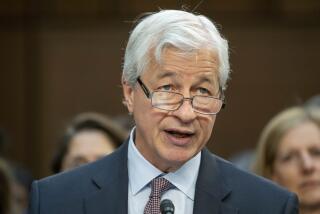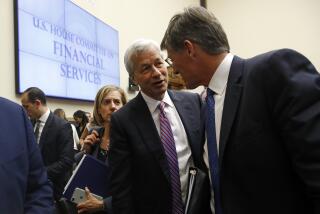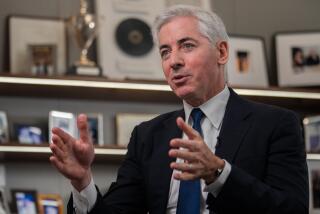JPMorgan CEO gives ‘A-plus’ performance in Capitol Hill testimony
WASHINGTON — Jamie Dimon again proved himself Wall Street’s able frontman in Washington, but his testimony on Capitol Hill may not head off tougher banking regulations following JPMorgan Chase & Co.’s risky trading losses.
Dimon, JPMorgan’s chairman and chief executive, appeared at ease with lawmakers as he fielded questions — some aggressive, but most deferential — at a Senate Banking Committee hearing Wednesday into the bank’s trading losses of more than $2 billion.
Although the hearing focused on how JPMorgan sustained the embarrassing loss, the two-hour session veered into larger debates over financial regulations. That put Dimon in a familiar role of Wall Street’s savvy, shoot-from-the-hip spokesman.
“He displayed a knowledge of the issue, but was never rattled and never looked arrogant. All around, it was an A-plus performance,” said Jaret Seiberg, a senior policy analyst in Washington with financial services firm Guggenheim Partners. “He’s the smoothest guy in banking under fire.”
In his testimony, Dimon again apologized for the stunning losses the bank suffered by wrong-way derivative bets made by a trader known on Wall Street as “the London Whale.” The JPMorgan chief said the bank would probably seek to recover compensation from employees at fault for the risky trades, though such a move would need approval by the bank’s directors.
The multibillion-dollar losses disclosed May 10 were a black eye for Dimon, especially because he earned a sterling reputation for steering the bank through the financial crisis. The bank’s disclosure reignited calls for tougher banking rules as regulators hammer out specifics of new restrictions by the Dodd-Frank financial overhaul borne of the financial crisis.
Critics have since called for tighter restrictions on proprietary trading and even breaking up the nation’s big banks. But Dimon told senators the financial system needs “strong regulation, not always more.”
“I would prefer a simple, clean, strong regulatory system with real intelligent design, and that’s not what we did,” Dimon said.
Wall Street seemed enthused by Dimon’s performance. Analysts said Dimon’s testimony helped soften negative fallout for the banking industry from JPMorgan’s trading loss.
Even though major U.S. stock indexes lost ground Wednesday, JPMorgan’s stock shot up 1.6% to $34.30 a share. Dimon’s testimony helped add $2 billion to the company’s market value.
Investors seem relieved that senators’ questions did not indicate greater pressure on regulators to tighten rules on the financial industry, said Todd Hagerman, a banking analyst at Sterne Agee & Leach in New York.
But although Dimon “did exceptionally well,” regulators are likely to be undeterred from imposing tougher regulations on trading and capital requirements, Hagerman said.
“We’re going to have tougher regulations,” he said, calling the hearing “rather benign, quite frankly.”
Much of the focus has been on the so-called Volcker Rule, a provision of Dodd-Frank that sharply limits banks’ ability to trade with its own funds. JPMorgan has argued its bad bets weren’t “propriety trading,” but portfolio hedging intended to protect the bank from an economic downturn.
Dimon, prodded by Sen. Jack Reed (D-R.I.), said it was “possible” the Volcker Rule could have prevented JPMorgan’s derivatives losses.
“I don’t know what the Volcker Rule is,” Dimon said. “It hasn’t been written yet. It’s very complicated. It may very well have stopped parts of what this portfolio morphed into.”
Sen. Jeff Merkley (D-Ore.), who was one of Dimon’s most aggressive questioners during Wednesday’s hearing, said Dimon, probably unintentionally, made a strong case for the tougher limits on bank risk taking as part of the Volcker Rule.
“Every single thing that Dimon said demonstrated the risks inherent in hedge fund-style trading when you’re a bank,” Merkley said.
Dimon defended the bank’s hedging strategy as a way to protect against steep losses in the event of an economic downturn or financial market disruptions.
“It was protecting the downside risk of the company — and, in fact, the biggest risk of the company,” Dimon said. “There are two major risks that JPMorgan faced: dramatically rising interest rates and a global type of credit crisis.… So the hedge was intended to improve our safety and soundness, not to make it worse.”
Dimon is scheduled for a second appearance on Capitol Hill next week before the House Financial Services Committee.







